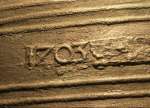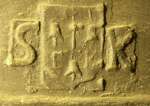
Casting date: 1703

'CW' (Church warden) with image of a man

Oak leaves and acorns

'SK': Samuel Knight's sheild
The tower was built some time around 1450. In 1556 there were four bells in the tower, but we know nothing about them. It seems fair to guess that they might have been cast by the Wokingham Bell Foundry, about 10 minutes walk from the church. The first bells we know anything about are the ring of six bells, which Samuel Knight of Reading hung in a timber frame in 1704. We still have two of Knight's bells (see inscriptions ) though after tuning in 2004 they sound far better than he would have imagined. None of the other four remain, and we can only speculate on their quality, since Thomas Mears recast two of them in 1814.
The other two were recast during the augmentation from six to eight, in an iron frame supported on steel beams, in 1903 by Webb & Bennett of Kiddlington. When the original wooden frame was replaced, it was discovered that the supporting beams that were almost completely rotted away. The previous half a century had seen much repair and renovation to the rest of the church building, including the nave roof and chalk pillars .
In the 2004 restoration , four of the bells were replaced, and all tuned to modern standards, to give a much improved sound .
Bells are traditionally measured in imperial units: inches for diameter and hundredweights-quarters-pounds for weight. These are given in the table below with the metric equivalent underneath.
The inscriptions on each bell are listed here in date order, which does not replicate the physical layout on the bell.
Some of the inscriptions include a pictorial founders mark, indicated here with the codes: [@] = Whitechapel symbol, [#] = Knight's shield.
Weights are given in the traditional imperial units with (the metric equivalent) in brackets.
| Bell | Diameter | Weight | Note | Inscriptions on bell | Plaque on headstock |
| 1 | 28.8" (0.73m) |
5-2-7 (279kg) |
E | CELEBRATING COMMUNITY APPEAL RECAST 20 [@] 04 WHITECHAPEL MEARS & STAINBANK. FOUNDERS. LONDON. 1903 |
Headstock donated in memory of Eleri Siân Goyder |
| 2 | 29.75" (0.76m) |
5-3-3 (290kg) |
D# | ALL SAINTS BELLRINGERS RECAST 20 [@] 04 WHITECHAPEL MEARS & STAINBANK. FOUNDERS. LONDON. 1903 |
Headstock donated by John and Jan Douglas |
| 3 | 31.5" (0.80m) |
6-1-25 (324kg) |
C# | TELL OUT MY SOUL THE GREATNESS OF THE LORD RECAST 20 [@] 04 WHITECHAPEL T. MEARS OF LONDON FECIT 1814 |
Headstock donated by Eve Reader |
| 4 | 33.75" (0.86m) |
6-2-14 (332kg) |
B | RECAST BY MEARS & STAINBANK LONDON. 1903 S [#] K 1704 |
Headstock donated by John Reader |
| 5 | 36.25" (0.92) |
8-0-7 (403kg) |
A | RECAST BY MEARS & STAINBANK LONDON. 1903 S 1703 K | |
| 6 | 37.7" (0.96m) |
10-0-5 ( 502kg) |
G# | GIVEN BY JOHN & ANNE HARRISON RECAST 20 [@] 04 WHITECHAPEL T. MEARS OF LONDON FECIT 1814 | |
| 7 | 43.2" (1.10m) |
13-3-10 ( 693kg) |
F# | JOHN HAWES ROBART HUNT CW 1704 S [#] K |
Headstock donated by Esme Few |
| 8 | 46.4" (1.18m) |
15-2-11 (780kg) |
E | JOHN HAWES ROBART HUNT CW SAMUEL KNIGHT MADE THIS PELE 1703 |
Headstock donated by Margaret and Arthur Moss |
The two additional bells in the tower are:
| Bell | Location | Diameter | Weight | Note | Inscription |
| Service bell | In bell chamber, above the main bellframe | 23.9" (0.61m) |
4-0-0 (200kg) |
A flat | TO THE GLORY OF GOD AND IN MEMORY OF CANON BERTRAM LONG, RECTOR 1904 - 1933 AND OF MABEL HIS WIFE RECAST IN 1952 AND GIVEN BY THEIR CHILDREN AND PARISHIONERS MEARS & STAINBANK |
| Clock bell | On roof | 18" (0.55m) |
2-3-0 (138kg) |
(none) |
See also ... Timeline of bells and fittings
 Casting date: 1703 |
 'CW' (Church warden) with image of a man |
 Oak leaves and acorns |
 'SK': Samuel Knight's sheild |
If you visit the church, you will find an informative 3-fold leaflet about the bells.
See also - Timeline of bells and tower. See - Pictures and details of the bell chamber. See - How bells work . How bells are made. See - Pictures of the clock .
Did you know? :
| Back to Top | Back to Tower | Return to Home page | Feedback |